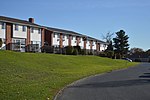Ashley Reservoir
1873 establishments in MassachusettsAC with 0 elementsGeography of Holyoke, MassachusettsReservoirs in Massachusetts

Ashley Reservoir, a Class II hazard reservoir, is the secondary drinking supply for the city of Holyoke, Massachusetts. The reservoir, consisting of Wright Pond and Ashley Pond, has an impound capacity of more than 795 million gallons of water and a safe yield of 2.1 million gallons of water per day. The reservoir's construction finished and it became fully operational in 1897. Ashley Reservoir is connected to a smaller reservoir McLean Reservoir, named after Holyoke Water Works Commissioner Hugh McLean, through a water-pumping plant that is operated by the Holyoke Water Works. The reservoir has a surrounding gravel road open to civilian recreational use.
Excerpt from the Wikipedia article Ashley Reservoir (License: CC BY-SA 3.0, Authors, Images).Ashley Reservoir
Whitney Avenue, Holyoke
Geographical coordinates (GPS) Address Nearby Places Show on map
Geographical coordinates (GPS)
| Latitude | Longitude |
|---|---|
| N 42.175 ° | E -72.661 ° |
Address
Whitney Avenue
Whitney Avenue
01703 Holyoke
Massachusetts, United States
Open on Google Maps






